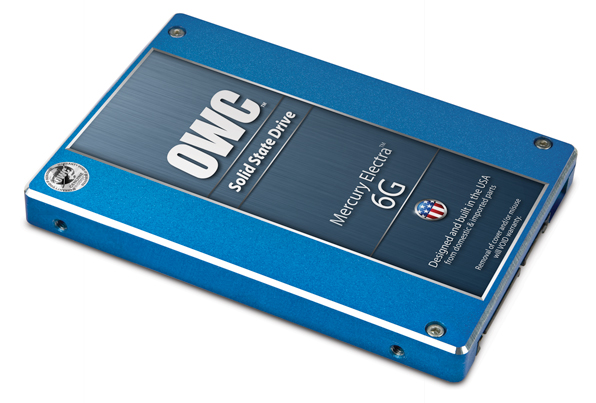I’ve had the opportunity to review several of Other World Computing’s high-end SSD’s now, and I am pleased to note that I have never been significantly disappointed with one of their offerings. OWC has recently released a new and lower-priced SATA III SSD called the Mercury Electra 6G. Read on for my thoughts.
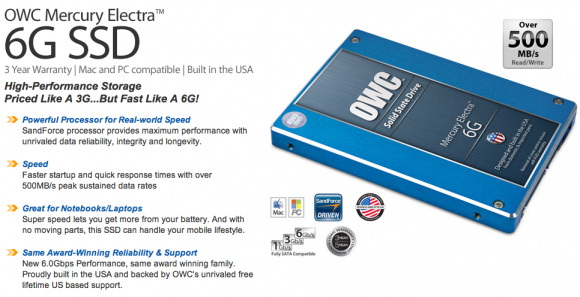
Overview
While looking back on my review of OWC’s Mercury Extreme Pro 6G a while back, I drew a lot of parallells between that series and the new Electra 6G series. In many ways, the Electra 6G series seems to me to be a cost-friendly consumer-level response to the Mercury Extreme Pro 6G.
With that thought in mind, I decided to approach this review from the standpoint of a comparison between the two models of SSD – the Mercury Extreme Pro 6G on the one hand, and the new Mercury Electra 6G on the other.
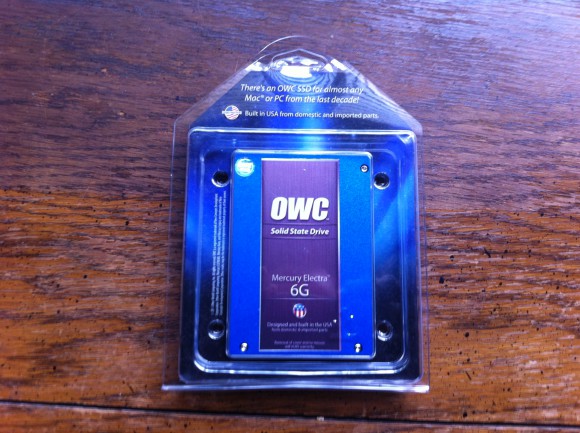
Testing Method
As is my usual custom with testing an SSD, I opted to retain a much larger and slower 7200RPm rotary drive in place of the optical bay, so that I could use it for auxiliary storage, while keeping OS X and my applications on the faster and better-performing SSD. For the testing, I used a fresh install of OS X 10.6.8 Snow Leopard, and only loaded the applications necessary for testing, as well as setting up my iTunes and iPhoto libraries, just as with my testing of the Mercury Extreme Pro 6G.
To perform the benchmarks, I utilized three seperate methods – first, so-called “common” benchmarks in which I used OS X to transfer files and time-test booting and app loading scenarios. Second, I used the DigLloydTools suite of benchmarking tools, and finally, I used a free Mac App Store app called the BlackMagic Disk Speed Test (Free, App Store Link).
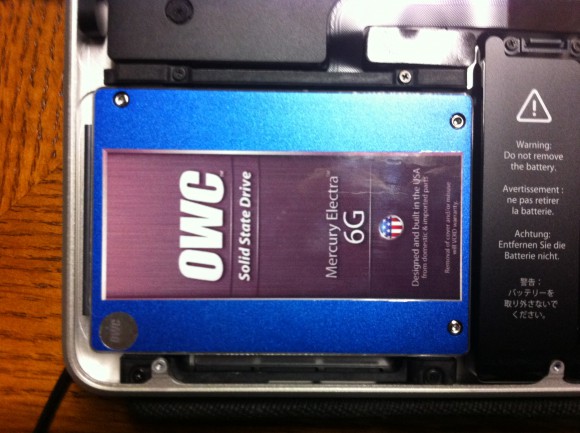
Performance
Performance, both in benchmarks and in real-world usage, was quite similar across the board, with the Electra 6G achieving only slightly slower results than its more expensive big brother. The main differences that I could discern to account for the price difference were a difference in the available warranty of the two units (5-year warranty versus 3-year) and the cost.
The Mercury Electra 6G, while admittedly a step behind its predecessor, nevertheless performed swiftly, consistently, and presented no issues in performing common or more intensive benchmark-level tasks. It simply did what it was designed to do in a very swift and efficient manner.
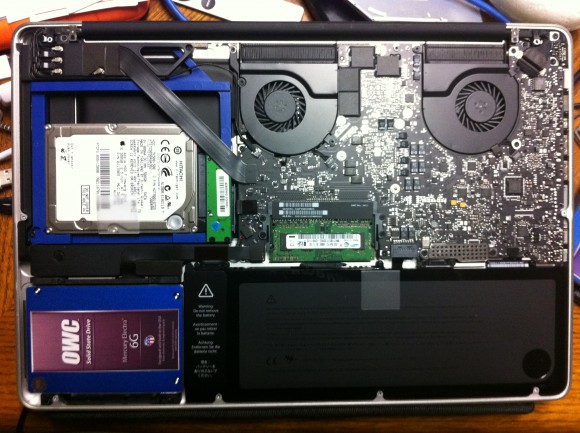
Differences
While the Electra 6G makes excellent use of its SATA III interface, going far beyond the 3Gbps limitation of SATA II, it does fall somewhat short of the Extreme Pro 6G’s speeds. Rather than achieving read speeds of up to 560MB/Sec and write speeds of up to 530MB/Sec, I instead was only able to obtain a maximum of 516 MB/Sec read speeds and 504MB/Sec write speeds.
In practical experience, I can tell you that these speed differences make very little impact on day-to-day use, and I found that my boot and program launch speeds were relatively unaffected. Moving large files to and from the drive took slightly longer on the Electra 6G.
Benchmark Results
Using the boot and photoshop tests that I used in the Mercury Extreme Pro 6G benchmarks, I can report that Photoshop loaded in the same 3 seconds as it took the Extreme Pro 6G, and in booting my computer from a powered-off rest state, I was able to completely boot with all applications and components loaded in 11 seconds – that’s two seconds slower than the Mercury Extreme Pro 6G.
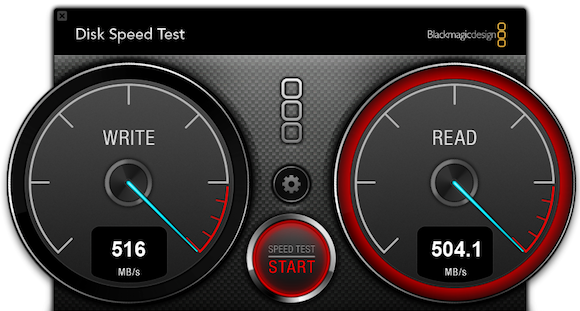
Using the same MKV movie that I used in the Mercury Extreme Pro 6G review, I was able to convert the file in its entirety in 12 minutes and 46 seconds – that’s 46 seconds longer than the Mercury Extreme Pro 6G. Below is a screenshot showing my formal benchmark results with the Electra 6G.
Assessment
All-in-all, I found that both the Mercury Extreme Pro 6G, as well as the new Mercury Electra 6G both performed extremely well, and although the Mercury Electra 6G did fall notably behind the Extreme Pro 6G, I felt that the difference in the pricing between the two drives (The 120GB drives run for $209 for the Electra 6G, all the way up to $279 for the Extreme Pro 6G) more than merited the difference in performance.
The Mercury Electra 6G is an extremely solid device for the money, and for what speed and performance differences existed between the two models (which, for most end users, would be nominal at best), I find the Mercury Electra 6G to be a solid competitor for the money. Consumers that don’t need a 5-year warranty, and are concerned about the cost of the upgrade may very well find that the Electra 6G more than suits their performance needs.
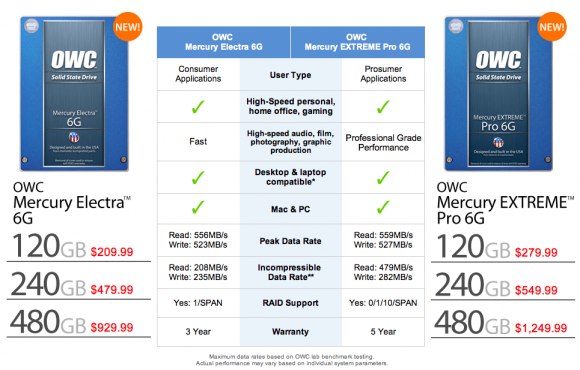
Verdict & Information
Rating: 5/5
For the Mercury Electra 6G’s strong performance, affordable price point, and comparability to the higher-end Mercury Extreme Pro 6G line of drives, I cannot help but award the Mercury Electra 6G a full 5 out of 5 stars. The Mercury Electra 6G is very affordable, is incredibly robust, and offers an unmatched level of performance and reliability for the money, and stands as one of the best values for the money in the SSD world – especially for drives supporting SATA III.
For more information, or to purchase the Mercury Electra 6G ($210 for 120GB, $480 for 240GB, $930 for 512GB), visit Other World Computing’s product page on the web. I highly recommend the Mercury Electra 6G as an affordable and high-performance alternative to similar and more expensive offerings.
And finally, last but not least, we’d like to thank our friends over at OWC for allowing us to review their amazing new hardware. Thanks!

